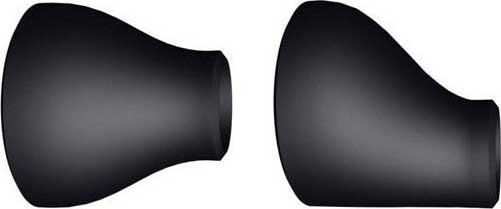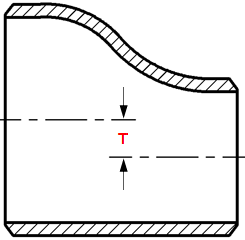Knowledge About Pipe Reducer
Butt Weld Fittings: Reducer
Reducers be applied, to change from pipe diameter in one direction. Standard there are 2 possibilities, the concentric reducer, is usually used in vertical pipe lines, and the eccentric reducer that is used in horizontal pipe lines.

Concentric Eccentric
TF & BF
On an isometric view, in a horizontal line, with a eccentric reducer must be declared, or the flat side at the bottom or top must be assembled. Perhaps, you have ever seen on a drawing, the abbreviation “TF” or “BF”. This stands for respective “top flat” and “bottom flat”
For example:
- Bottom flat eccentric reducer are often be used in pipe racks to keep the pipeline at the same elevation, after a pipe size change. When a concentric or a flat on top eccentric reducer in a pipe rack will be used, the support detail, probably change.
- Top flat eccentric reducer are often be used in pump suction lines to avoid accumulation of gas pockets.Eccentric reducers can avoid small “dead spots” that exist behind concentric reducers.

Some draughtsmen also specify the size difference T between the center lines. As a eccentric reducer in a vertical line is used, it may also be important, which side should be oriented to the north, south, east or west.
Length of reducers
The length of a Reducer is very short in relation to the diameter, so in some dimensions the transition from one to another diameter is very abruptly. For example, a reducer 6″ x 2.1/2″ has a length of 140 mm. On this short distance a pipeline will be reduced from 168.3 mm O.D. to 73 mm O.D. During the design phase of a new pipe system, a piping designer certainly must think about it.
An alternative for a smoother flow would be to apply multiple reducers like:
- 6″ x 5″ (L=140 mm)
- 5″ x 4″ (L=127 mm)
- 4″ x 3.1/2″ (L=102 mm)
- 3.1/2″ x 3″ (L=102 mm)
- 3″ x 2.1/2″ (L=102 mm)
So, now the distance is approximately 573 mm if the 6″ pipe is reduced to 2.1/2″ inches, and and a smoother flow is guaranteed.
In practice this example will probably never occur, I hope, no no, I’m sure, there are better designers like me.






0 comments:
Post a Comment